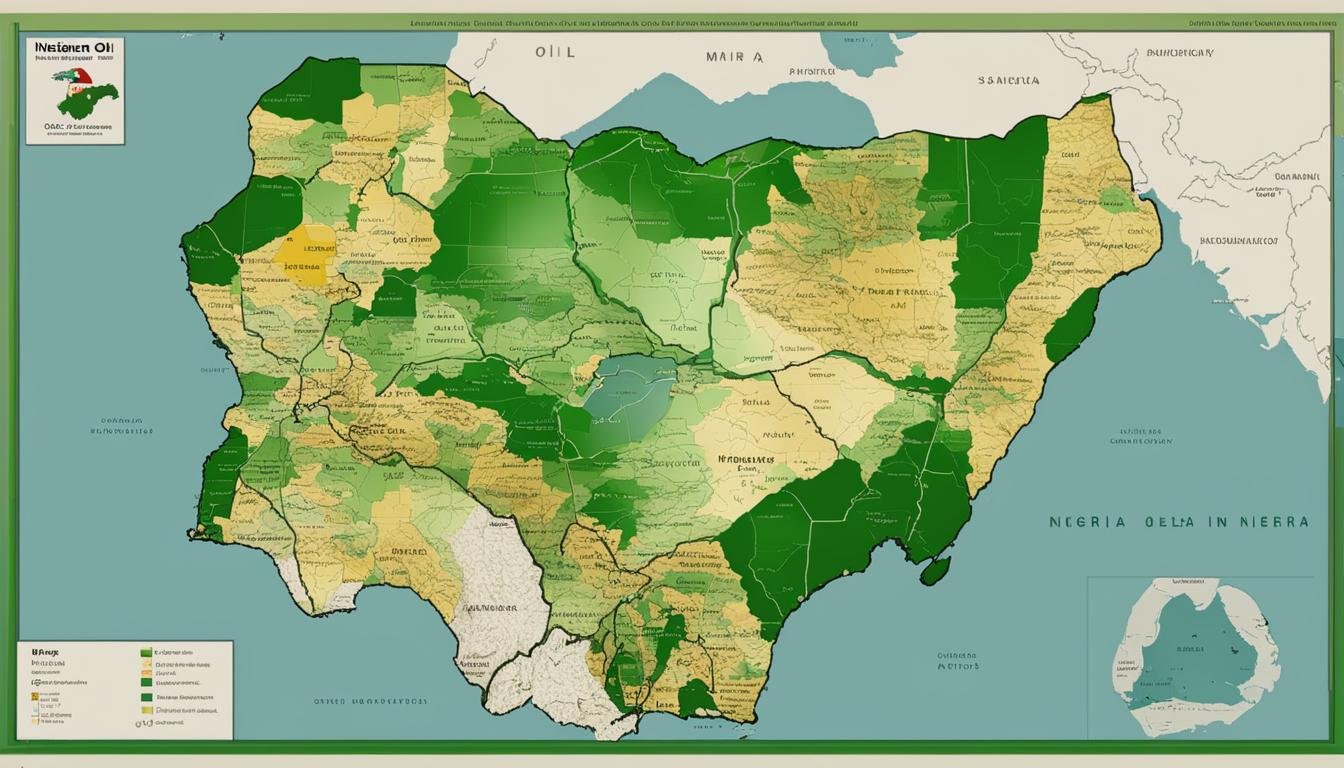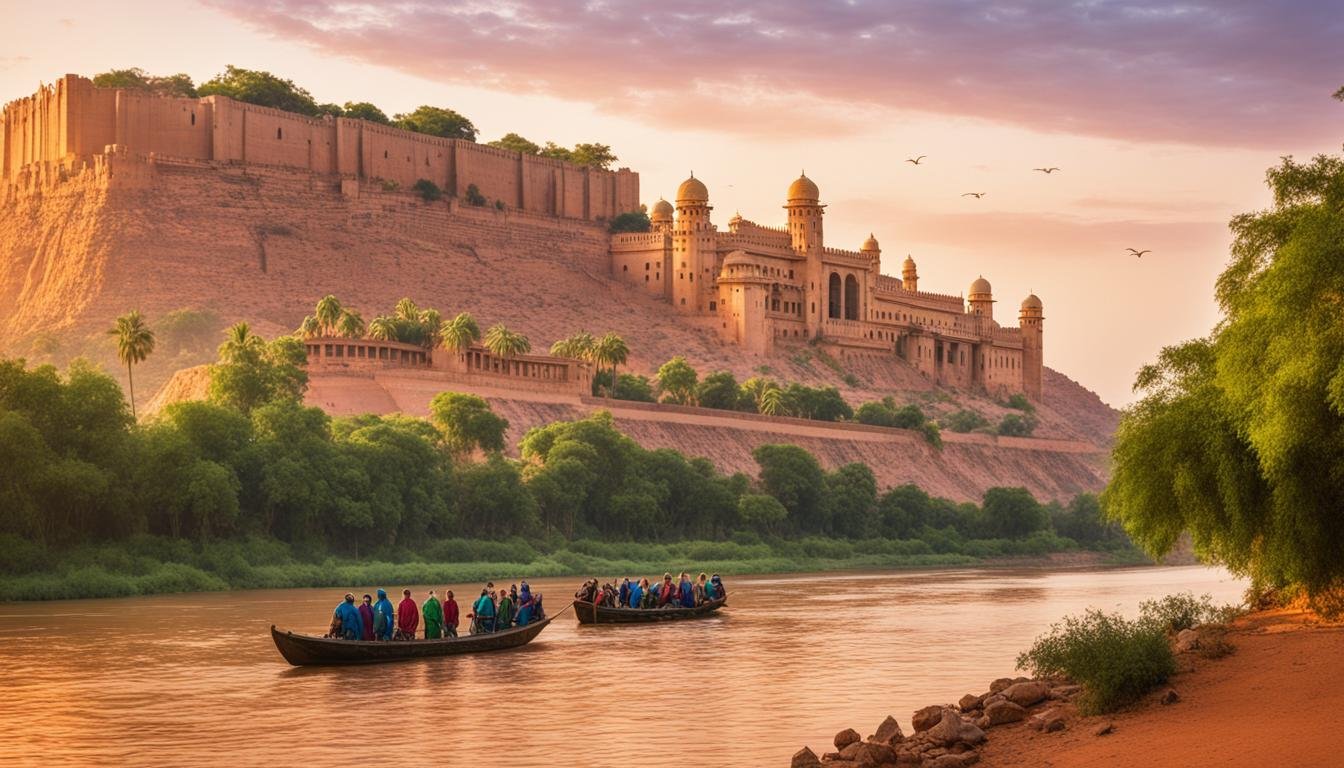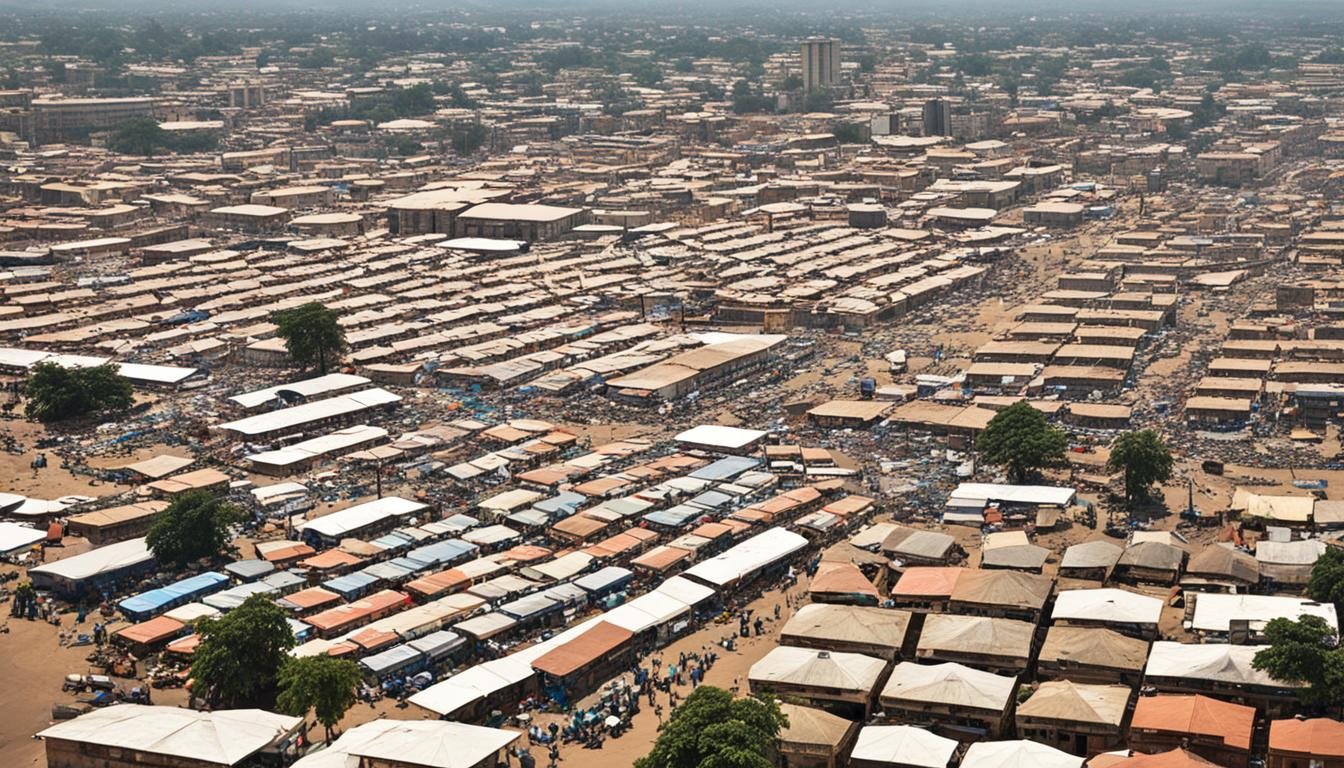Hey there! Welcome to this quick guide on Nigerian states and their capitals. Nigeria, located in West Africa, is a country consisting of 36 states and the Federal Capital Territory (FCT), home to the capital city, Abuja. Each state in Nigeria has its own capital city. Let’s explore them together!
Key Takeaways:
- Nigeria is made up of 36 states and the Federal Capital Territory (FCT).
- Each state in Nigeria has its own capital city.
- The capital city of Nigeria is Abuja.
- Understanding the Nigerian states and their capitals is essential to grasp the country’s political and administrative structure.
- Exploring Nigeria’s diverse regions and their capital cities provides insight into the country’s cultural richness.
Introduction to Nigeria’s Political Structure
Nigeria operates as a federal republic with a presidential system of government. The country gained independence from British colonial rule on October 1, 1960, and adopted a republican constitution in 1963. The political structure of Nigeria is characterized by a division of power between the federal government and the individual states.
The federal government of Nigeria is responsible for national-level governance, including defense, foreign affairs, and economic planning. It is headed by the President, who is both the head of state and the head of government.
In Nigeria, power is shared between the federal government and the 36 states, each having its own government and political structures. This division of power is essential for ensuring effective governance and representation at both the national and state levels.
The Nigerian government follows a system of checks and balances, where the executive, legislative, and judicial branches have separate but complementary roles. This ensures accountability and prevents the abuse of power.
The federal republic of Nigeria recognizes the importance of decentralized governance, allowing states to have their own governments and political systems. This helps in addressing the unique needs and aspirations of the diverse regions and communities within the country.
Next, we will explore the comprehensive overview of the states with their capitals in Nigeria, highlighting the significance of Nigeria’s capital cities and their roles in the country’s governance and development.
Comprehensive Overview of States with Capitals in Nigeria
Understanding Nigeria’s Capital Cities:
The capital city of each state in Nigeria plays a significant role in its governance and administration. These cities serve as the political, economic, and cultural centers of their respective states. They are home to state government offices, including the governor’s office, state assemblies, and various administrative departments.
Regional Distribution of Nigerian State Capitals
In Nigeria, the state capitals are distributed across the country’s six geopolitical zones, each encompassing multiple states. The regional distribution of Nigerian state capitals is as follows:
North West: Kano, Kaduna, Sokoto, etc.
North East: Maiduguri, Yola, Bauchi, etc.
North Central: Abuja, Lokoja, Ilorin, etc.
South West: Lagos, Ibadan, Abeokuta, etc.
South East: Enugu, Owerri, Umuahia, etc.
South South: Port Harcourt, Calabar, Benin City, etc.
The Role of Capitals in Nigeria’s Governance
The capitals of Nigerian states play a crucial role in the country’s governance. They serve as centers for political decision-making, housing state government institutions and officials. These cities provide a physical space for the government to operate and carry out its administrative functions. They are also important for policy formulation, service delivery, and coordination among various government departments.
| Geopolitical Zone | States | Capital Cities |
|---|---|---|
| North West | Kano, Katsina, Jigawa, Kebbi, Sokoto, Zamfara | Kano, Katsina, Dutse, Birnin Kebbi, Sokoto, Gusau |
| North East | Borno, Yobe, Adamawa, Gombe, Bauchi, Taraba | Maiduguri, Damaturu, Yola, Gombe, Bauchi, Jalingo |
| North Central | Niger, Benue, Nasarawa, Plateau, Kogi, Kwara, FCT | Minna, Makurdi, Lafia, Jos, Lokoja, Ilorin, Abuja |
| South West | Lagos, Oyo, Ogun, Osun, Ondo, Ekiti | Lagos, Ibadan, Abeokuta, Osogbo, Akure, Ado-Ekiti |
| South East | Enugu, Imo, Abia, Ebonyi, Anambra | Enugu, Owerri, Umuahia, Abakaliki, Awka |
| South South | Rivers, Bayelsa, Cross River, Akwa Ibom, Delta, Edo | Port Harcourt, Yenagoa, Calabar, Uyo, Asaba, Benin City |
Exploring Nigeria’s Diverse Regions and Their Capitals
Nigeria is a country with diverse regions, each offering its own unique culture, landscape, and capital city. These regions are the heart and soul of Nigeria, showcasing the vibrant diversity that the country has to offer. From the bustling cityscape of Lagos to the serene beauty of the Niger Delta, each region has something special to offer.
Let’s take a closer look at some of the diverse regions in Nigeria and their respective capital cities:
| Region | Capital City |
|---|---|
| South-West | Lagos |
| South-South | Port Harcourt |
| South-East | Enugu |
| North-Central | Abuja |
| North-West | Kaduna |
| North-East | Maiduguri |
These regions represent the rich tapestry of Nigeria’s cultural heritage and offer a glimpse into the various ethnic groups and traditions that make up the country. From the Yoruba of the South-West to the Igbo of the South-East, each region has its own distinct identity and contributes to the cultural mosaic of Nigeria.
Exploring these diverse regions and their capital cities allows us to delve deeper into the essence of Nigeria and gain a better understanding of its people, traditions, and history.
Nigeria’s Capitals: Economic and Cultural Significance
Capital Cities as Economic Powerhouses
Nigeria’s capital cities play a crucial role in driving economic growth and development. These cities are often centers of trade, commerce, and industry, attracting businesses and investments. With their strategic location and well-developed infrastructure, the capital cities provide a conducive environment for companies to thrive and expand. The presence of government institutions, financial institutions, and a skilled workforce further strengthens their position as economic powerhouses.
These capital cities contribute significantly to the national economy by generating employment opportunities and fostering entrepreneurship. The presence of diverse industries and sectors promotes innovation and collaboration, attracting domestic and international investors. As a result, capital cities in Nigeria become pivotal drivers of economic growth, stimulating the creation of new businesses and driving the development of key industries.
Culturally Rich Capitals in Nigerian States
Aside from their economic importance, Nigeria’s capital cities are also renowned for their cultural significance. These cities serve as cultural hubs, representing the diverse heritage, traditions, and arts of their respective states. They showcase a rich tapestry of ethnicities, languages, and customs, allowing visitors to immerse themselves in Nigeria’s vibrant cultural landscape.
From historical landmarks to museums and performing arts centers, the capital cities offer a myriad of opportunities to experience Nigerian culture firsthand. Festivals, exhibitions, and events further highlight the cultural vibrancy of these cities, bringing people together to celebrate and appreciate their shared heritage.
Capital Cities as Hubs for Tourism and Investment
“Exploring the cultural landmarks, heritage sites, and natural beauty of Nigeria’s capital cities is a rewarding experience for tourists and investors alike.”
With their cultural and historical attractions, Nigeria’s capital cities have become popular tourist destinations. Visitors can explore iconic landmarks, such as the Aso Rock in Abuja or the National Museum in Lagos, to gain insight into the country’s history and heritage. The cities’ vibrant markets, traditional cuisine, and lively nightlife also offer a unique sensory experience for tourists.
Beyond tourism, these capital cities attract significant investment opportunities. The favorable business environment, government support, and access to resources make them attractive destinations for investors looking to tap into Nigeria’s diverse sectors, including finance, technology, and real estate. By investing in the capital cities, both local and international investors contribute to the economic growth of Nigeria and benefit from the opportunities these cities offer.
| Capital City | Economic Sector | Key Investments |
|---|---|---|
| Lagos | Finance, Technology, Entertainment | Banking, Fintech, Film Industry |
| Abuja | Government, Services, Construction | Government Institutions, Hospitality, Infrastructure |
| Port Harcourt | Oil and Gas, Manufacturing | Petroleum Industry, Manufacturing Plants |
| Kano | Commerce, Agriculture, Manufacturing | Textile Industry, Agricultural Processing, Trade |
Conclusion
In conclusion, Nigeria is a diverse country with 36 states, each with its own capital city. These capital cities are more than just administrative centers; they are the heart and soul of their respective states, representing the political, economic, and cultural identity of the people.
Understanding Nigeria’s political structure is crucial to grasp the dynamics of governance in the country. With its federal republic system, power is distributed between the federal government and the individual states, ensuring a balance of authority and responsibility.
Nigeria’s diverse regions are a testament to the country’s rich tapestry of cultures and landscapes. From the bustling energy of Lagos in the southwest to the serene beauty of Calabar in the south-south, each region offers a unique experience and has its own capital city, serving as a gateway to its offerings.
The economic and cultural significance of Nigeria’s capital cities cannot be overstated. These vibrant hubs are not only centers of governance but also major contributors to the national economy. From driving trade and commerce to attracting investments and promoting tourism, they play a vital role in shaping the country’s growth and development.
FAQ
What is Nigeria’s political structure?
Nigeria operates as a federal republic with a presidential system of government.
How many states are there in Nigeria?
Nigeria is made up of 36 states and the Federal Capital Territory (FCT).
What is the capital city of Nigeria?
The capital city of Nigeria is Abuja.
Does each state in Nigeria have its own capital city?
Yes, each state in Nigeria has its own capital city.
Why are capital cities important in Nigeria?
Capital cities in Nigeria play a significant role in governance, administration, and serve as political, economic, and cultural centers of their respective states.
What are the economic roles of Nigeria’s capital cities?
Nigeria’s capital cities drive economic growth and development, serving as centers of trade, commerce, industry, and providing employment opportunities.
Do Nigeria’s capital cities have cultural significance?
Yes, Nigeria’s capital cities are culturally rich, contributing to the preservation and promotion of diverse cultural heritage.
Are Nigeria’s capital cities popular tourist destinations?
Yes, Nigeria’s capital cities attract tourists due to their cultural sites, historical landmarks, and vibrant atmosphere. They also serve as hubs for investments.
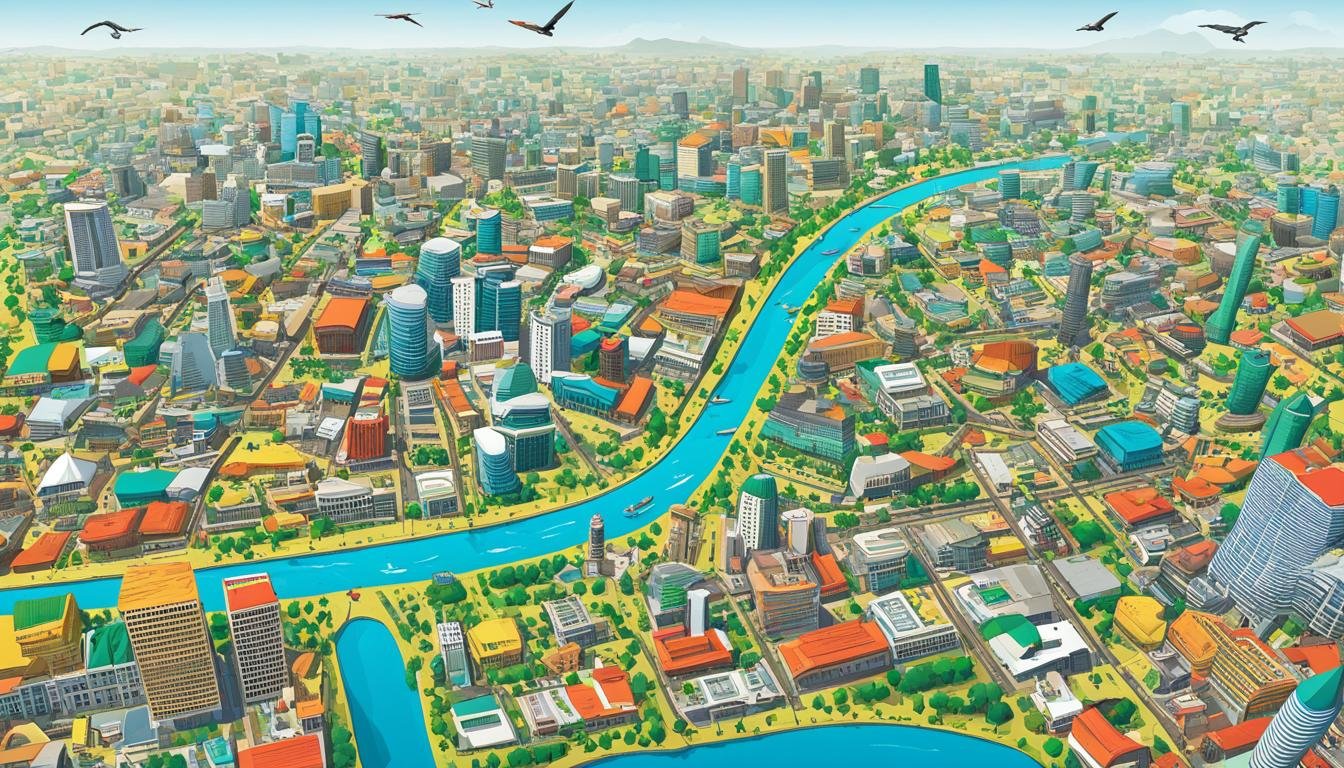
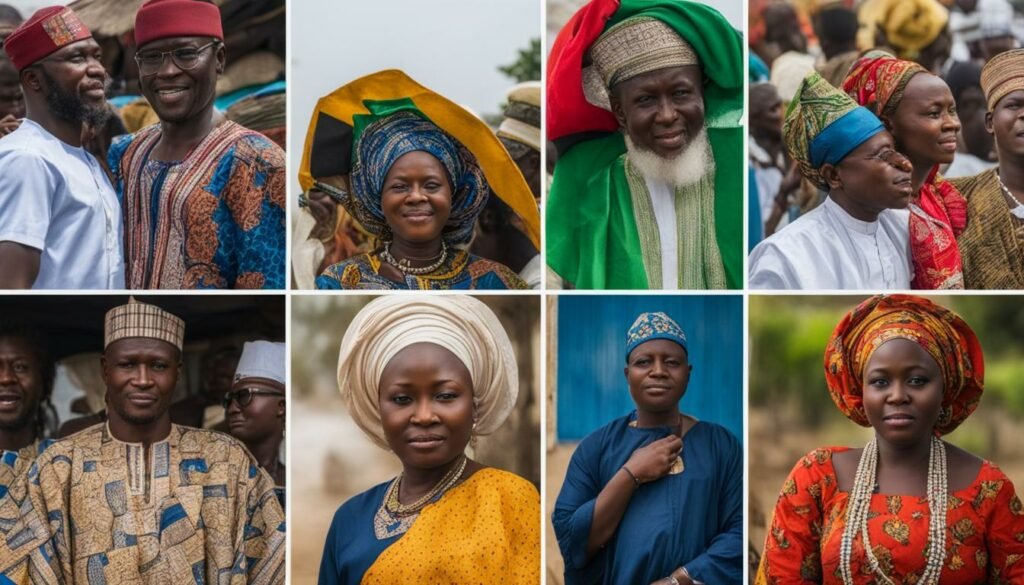
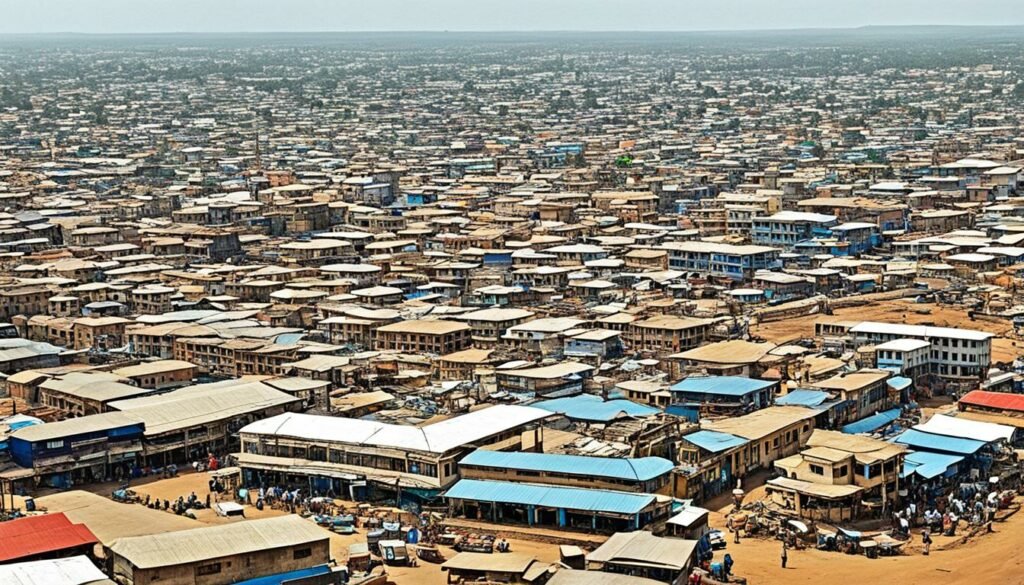

![Saudi Oil Industry Key Stats Unveiled [2024] 3 Saudi Oil Industry Key Stats](https://zoets.b-cdn.net/wp-content/uploads/2024/02/h.jpg)



